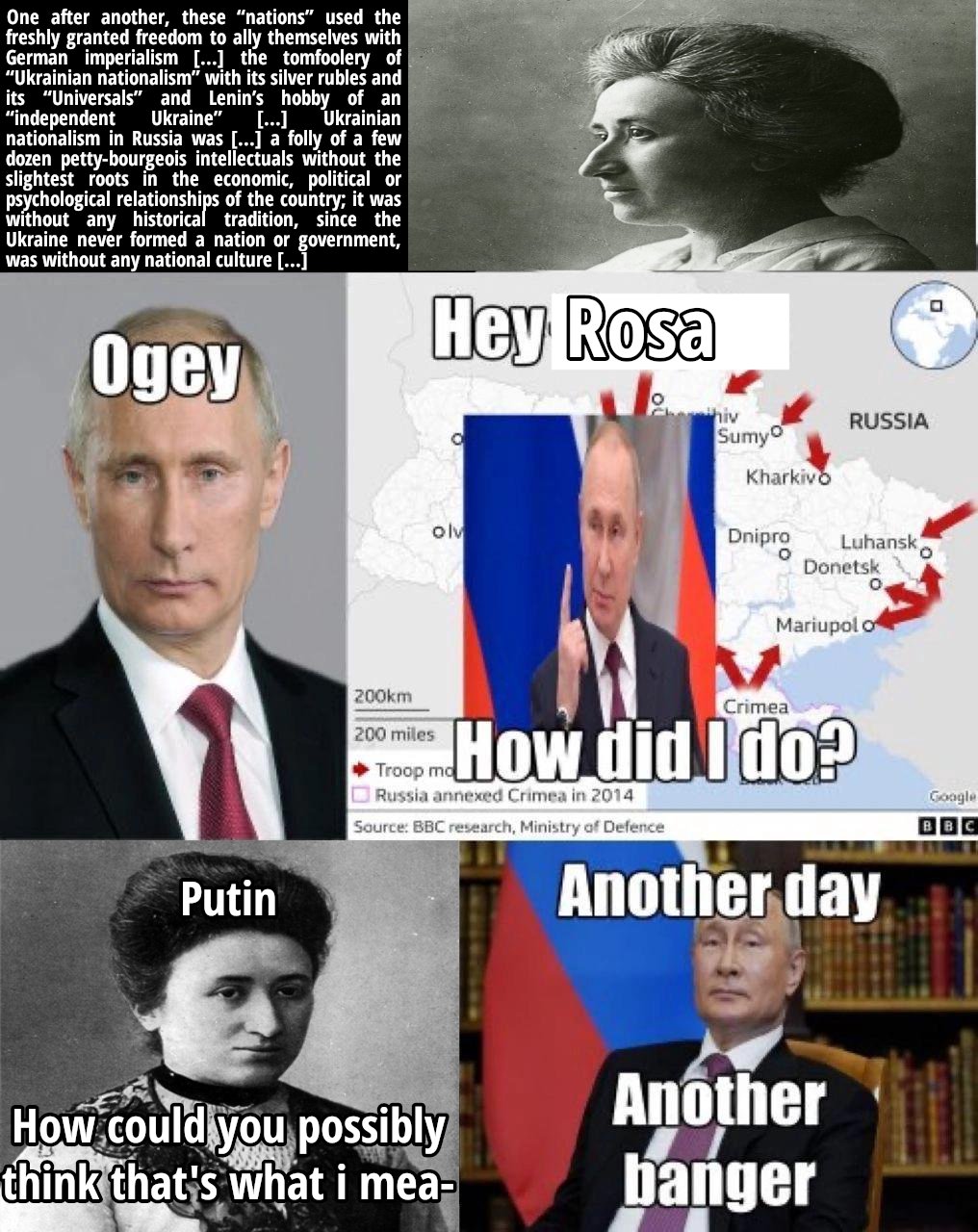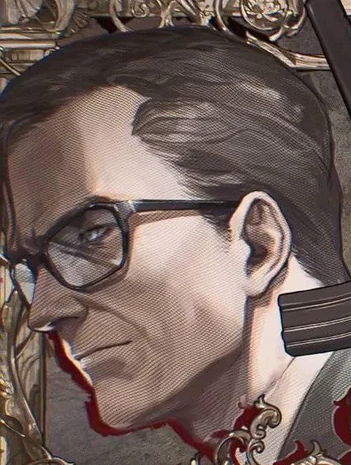It is at least forgivable in so far as the Nakba of '48 hadn't happened yet and an interracial utopian socialist Middle East was functionally in the cards.
If anything, this is more the fault of Truman and the rush to mobilize into a Cold War footing. Had the US and Russia not pivoted into conflict after the war, the Israel/Palestine dispute could have been one of those disputes a peace-inclined UN hammered out before copious amounts of blood got spilled.
But there had been plenty of zionist violence in mandatory palestine by that point, yes?
Yes but it was a bit of a footnote in the colonial violence of the British mandate. The USSR in the 20s and 30s called out the Yishuv as an arm of British colonialism.
In the immediate post-war period the Soviets wanted the British mandate ended and the Arab-Jewish conflict “resolved” by making the territory a mandate for the UN Security Council collectively (effectively transferring the mandate to the big 3 in lieu of a permanent solution) but the British and Americans were against this which is when the Soviet policy became basically the “two state” solution.
There was already a significant Jewish population and deporting them all just a couple of years after the Holocaust would have been pretty unpalatable + there was sympathy for the idea of a Jewish homeland as a kind of compensation or repentence for the Holocaust so Jewish people living in Palestine was at this point a fait accompli to be accommodated somehow. But the Soviets were also against the colonialism of it all and respected the rights of Arab and Palestinians to have their self-determination as well.
If you take evicting the Jewish population off the cards, and once the “one state” solution initially managed as a UN Security Council mandate fails, then a two-state solution is the obvious next thing - at least without the benefit of hindsight.
It’s supporting the two-state solution that gets framed as supporting the creation of the state of Israel, and fair enough because that is what 2-state means but the framing makes it present as supporting a colonial project when I think the more accurate framing is they were supporting what they saw as a least-bad way of resolving a British-endorsed colonial project that had already been underway for decades.
It’s pretty incorrect to say the Soviets wanted Israel to exist prior to about 1948 since in 1946 they were still advocating some kind of one-state UN mandate and still attempting to establish a Jewish Autonomous Oblast as an autonomous Jewish republic within the USSR rather than Palestine.
At that point in time it was already clear that the zionists were not interested in peaceful coexistence with the indigenous population of Palestine. Even Theodor Herztel wrote about how he wanted to use economic pressure to push out indigenous Palestinians and on numerous occasions throughout the interwar years, organised Palestinian resistance had invited zionist organisations to join them with the expectation that they would be a part of a free post-colonial Palestine. The zionists rejected this.
I honestly think this post should be removed for being so incorrect
Literally the source is a right wing writer for the Spectator. Such a joke, if you read Wikipedia check the footnotes and sourcing
The footnotes and sources are of more value than the articles on Natopedia
What source, it's a picture. Can you please post it, and the wiki article?
https://en.m.wikipedia.org/wiki/Joseph_Stalin_and_antisemitism
[27] Paul Johnson, A History of the Jews (1987) p. 527
Paul Johnson is a fervent anti communist
https://en.m.wikipedia.org/wiki/Paul_Johnson_(writer)
This takes 2 seconds for anyone ever reading wiki. Look at the source
Gonna have to push back here for a few reasons: 1. Just because a historian is conservative or even anticommunist, does not mean they are liars and their writings, if skewed toward their own ideological preferences and those of their audience, isn't based in fact. 2. I found A History if the Jews on Libgen, and the source that he cites is Howard Sachar, ‘The Arab-Israel Issue in the Light of the Cold War’, (Washington DC), 1966, 2.
I don't know about Howard Sachar's attitude toward communism, and I couldn't find a copy of the book that was cited, but I did find Dreamland: Europeans and Jews in the Aftermath of the Great War which contains about 150 pages about Rosa Luxemburg that casts her in a very good light from what I can tell. So not a guy with an axe to grind against communism.
Unfortunately I can't find an independent resource supporting the original claim (although I swear I've seen one somewhere) but your argument is, at best, disingenuous and based on vibes
The following is not a direct reply to you but a more general guideline that I suggest historiography nerds try to follow.
The key issue is not what is cited, but how its cited.
A book could exclusively cite communists, with 100% accurate citations to all primary sources, yet twist it in bias to present itself from the mild moralistic misinformation meandering to outright malicious fabrications of intent.
A person would have to make an explicit effort to read what was written, read the citations themselves to see their relevance to what was written, then keep looking back through all the citations of citations of citations until you find verifiable primary sources that through its own chain of primary evidence around it can either reinforce or undermine the original statement you read. And if you can't find primary source material that should spark your interest to dig deeper to find the truth. (Example: William Randolph Hearst's newspaper article written by Thomas Walker / Robert Green on his travels through the Ukraine during the famine of 32-33 have been cited as primary sources, even though other primary sources that recorded his locations reveal he spent the majority of his time on the trans-siberian railway heading to the Manchurian border, and prior to that he spent around a week in Moscow.)
But that's a lot of work as is, so barely anyone does it and just goes off of vibes of how many layers they can be bothered to peel back until they either satisfy whatever internal bias they have or they get bored.
I understand where you are coming from, but the fact of the issue at hand was discussed at Yalta conference with multiple English language representatives present and writing on it, and in 1945 he did not know what the correct answer was.
What this source is claiming is that Stalin was already planning an Israeli state in Palestine to sneak around his allies. It is claiming that Stalin is instigating proxy war. It is an attempt to blame the USSR for the Cold War and there is no evidence it is true.
No evidence this is true, Stalin did not have a clear policy until postwar WW2, and survivors of the Jewish Eastern European community started proposing Crimea be the Jewish State.
At the Yalta conference in 1945 Stalin did not have a clear plan, but showed Roosevelt disappointment that his Siberian Jewish state was not succeeding. He also shared that he felt the ethnic tensions would cause problems postwar. EDIT: He specifically cited the creation of the KKK in post civil war america
He had a clear understanding of the difficulties of building a new Jewish homeland, and was scared he’d be forced to give up prime land in his own nation that just lost 25 million people.
We need to talk about how the bolsheviks botched the national question and its horrifically right wing outcomes decades later. There’s a reason all those eastern european nations went radically right wing the second the USSR was dissolved. Nationalism run wild
Gotta admit, Rosa kinda called it.
From Luxemburg’s The Russian Revolution, Ch. 3: The Nationalities Question:
While Lenin and his comrades clearly expected that, as champions of national freedom even to the extent of “separation,” they would turn Finland, the Ukraine, Poland, Lithuania, the Baltic countries, the Caucasus, etc., into so many faithful allies of the Russian Revolution, we have instead witnessed the opposite spectacle. One after another, these “nations” used the freshly granted freedom to ally themselves with German imperialism against the Russian Revolution as its mortal enemy, and, under German protection, to carry the banner of counter-revolution into Russia itself. The little game with the Ukraine at Brest, which caused a decisive turn of affairs in those negotiations and brought about the entire inner and outer political situation at present prevailing for the Bolsheviks, is a perfect case in point. The conduct of Finland, Poland, Lithuania, the Baltic lands, the peoples of the Caucasus, shows most convincingly that we are not dealing here with an exceptional case, but with a typical phenomenon.
To be sure, in all these cases, it was really not the “people” who engaged in these reactionary policies, but only the bourgeois and petty-bourgeois classes, who – in sharpest opposition to their own proletarian masses – perverted the “national right of self-determination” into an instrument of their counter-revolutionary class politics. But – and here we come to the very heart of the question – it is in this that the utopian, petty-bourgeois character of this nationalistic slogan resides: that in the midst of the crude realities of class society and when class antagonisms are sharpened to the uttermost, it is simply converted into a means of bourgeois class rule. The Bolsheviks were to be taught to their own great hurt and that of the revolution, that under the rule of capitalism there is no self-determination of peoples, that in a class society each class of the nation strives to “determine itself” in a different fashion, and that, for the bourgeois classes, the standpoint of national freedom is fully subordinated to that of class rule. The Finnish bourgeoisie, like the Ukrainian bourgeoisie, were unanimous in preferring the violent rule of Germany to national freedom, if the latter should be bound up with Bolshevism.
The hope of transforming these actual class relationships somehow into their opposite and of getting a majority vote for union with the Russian Revolution by depending on the revolutionary masses – if it was seriously meant by Lenin and Trotsky – represented an incomprehensible degree of optimism. And if it was only meant as a tactical flourish in the duel with the German politics of force, then it represented dangerous playing with fire. Even without German military occupation, the famous “popular plebiscite,” supposing that it had come to that in the border states, would have yielded a result, in all probability, which would have given the Bolsheviks little cause for rejoicing; for we must take into consideration the psychology of the peasant masses and of great sections of the petty bourgeoisie, and the thousand ways in which the bourgeoisie could have influenced the vote. Indeed, it can be taken as an unbreakable rule in these matters of plebiscites on the national question that the ruling class will either know how to prevent them where it doesn’t suit their purpose, or where they somehow occur, will know how to influence their results by all sorts of means, big and little, the same means which make it impossible to introduce socialism by a popular vote.
On Ukraine:
Or take the Ukraine. At the beginning of the century, before the tomfoolery of “Ukrainian nationalism” with its silver rubles and its “Universals”[2] and Lenin’s hobby of an “independent Ukraine” had been invented, the Ukraine was the stronghold of the Russian revolutionary movement. From there, from Rostov, from Odessa, from the Donetz region, flowed out the first lava-streams of the revolution (as early as 1902-04) which kindled all South Russia into a sea of flame, thereby preparing the uprising of 1905. The same thing was repeated in the present revolution, in which the South Russian proletariat supplied the picked troops of the proletarian phalanx. Poland and the Baltic lands have been since 1905 the mightiest and most dependable hearths of revolution, and in them the socialist proletariat has played an outstanding role.
…
The best proof is the Ukraine, which was to play so frightful a role in the fate of the Russian Revolution. Ukrainian nationalism in Russia was something quite different from, let us say, Czechish, Polish or Finnish nationalism in that the former was a mere whim, a folly of a few dozen petty-bourgeois intellectuals without the slightest roots in the economic, political or psychological relationships of the country; it was without any historical tradition, since the Ukraine never formed a nation or government, was without any national culture, except for the reactionary-romantic poems of Shevschenko. It is exactly as if, one fine day, the people living in the Wasserkante[3] should want to found a new Low-German (Plattdeutsche) nation and government! And this ridiculous pose of a few university professors and students was inflated into a political force by Lenin and his comrades through their doctrinaire agitation concerning the “right of self-determination including etc.” To what was at first a mere farce they lent such importance that the farce became a matter of the most deadly seriousness – not as a serious national movement for which, afterward as before, there are no roots at all, but as a shingle and rallying flag of counter-revolution! At Brest, out of this addled egg crept the German bayonets.
(The entire chapter is quite short so it’s worth spending the 10 minutes reading it)
they would turn Finland, the Ukraine, Poland, Lithuania, the Baltic countries, the Caucasus, etc., into so many faithful allies of the Russian Revolution, we have instead witnessed the opposite spectacle. One after another, these “nations” used the freshly granted freedom to ally themselves with German imperialism against the Russian Revolution as its mortal enemy, and, under German protection, to carry the banner of counter-revolution into Russia itself.
How tf was this written in 1909?
fairly sure this was written in 1918
edit; yeah
- Rosa Luxemburg
- The Russian Revolution
-Written: 1918.
- Source: The Russian Revolution, by Rosa Luxemburg.
- Publisher: Workers Age Publishers (New York), © 1940.
- First Published: 1922 by Paul Levi.
- Translated: Bertram Wolfe.
The chapter I quoted came from The Russian Revolution (1918), I think you might have confused that with The National Question (1909) which was a separate work altogether.
Not just nationalism but also our naivete to how states act, regardless of whether they are 'socialist' or not. So many of the USSR's decisions prioritized the immediate interests/survival of the state at the expense of revolutions abroad and eventually those betrayals left it without the external support to survive the West's onslaught.
Kind of wild for a Russian to accuse a Georgian of Russian chauvanism isn't it?*
They did have a bunch of socialist energy to start so it wasn't super crazy. I it would be very hard to guess history would turn out the way it did so I am not to mad a pre-modern person guessing wrong on modern geopolitics
Stalin was a modern person, but more importantly, he did predict this was the route zionism would go. He opposed zionism consistently up to this point for a reason, and while he didn't have a clear goal or orders for the Communist Party of Palestine, he knew that even the socialist zionists would be in effect settlers and their project would be inherently liberal. He let the gamble be taken that maybe a multiracial state could be formed but after all of that
He had an 1800s education and he lived in the first half of the 1900s. I am not sure by what metrics we consider him a modern person.
Good info on the rest of it though
pre-modern is not exactly a relative term. Stalin lived firmly in the Late Modern Period, not early modern. When you say someone is a "pre-modern person" that indicates a specific time in historical periodization, one prior to the second industrial revolution. In terms of history Stalin is a modern figure. I don't think we need to say Stalin wasn't modern to defend his stance here. There is no exact science, but generally the contemporary period is post-WW2. Stalin is modern, but not contemporary.
not modern as in "past 20 years", modern as in modernism, if I had to guess https://en.wikipedia.org/wiki/Modernism
Which pretty much lines up with his lifespan actually
Yeah and post-modernism is first said in 1949, which makes Stalin firmly modern. When talking about history we are dealing with a scale so vast that modern is a century ago.
Terrance of trillbilly's has been talking about this a lot lately since he's been reading a book on the subject. I really disagree with his offhanded takes on how this is socialism in one country's failing and the fault of Comintern policies, but it is interesting to hear how a bunch of socialists who still kept a liberal mindset felt they could just establish this utopia and not do the same shit other colonizers did. There is a reason Stalin was so opposed to this for a long time, gave it a try, and then reverted real fast.
Controversial opinion: trotsky would have been poggers post 1945, nothing good came out of stalin constant appeasement of brits.
Trotsky didn't believe in anything. I don't understand how you can interpret his contrarianism as a sign he'd have done anything right.
Trotsky didn't believe in anything.
Of all the fucking takes.
"Trotsky has never yet held a firm opinion on any important question of Marxism. He always contrives to worm his way into the cracks of any given difference of opinion and desert one side for the other. At the present moment he is in the company of the Bundists and the liquidators. And these gentlemen do not stand on ceremony where the Party is concerned" -- V.I. Lenin (The Right of Nations to Self-Determination -- Vol. 20 of Collected Works, p. 447-48).
"Believe me, with [Roman Malinkovsky] one can build a workers' party." Lenin, January 1913 letter to Maxim Gorky
Lenin's entire work up to the revolution are in depth about why trotsky is unprincipled. Him being wrong in offhanded comments means fuck all compared to that. His lack of principles made him appealing to many revisionists including those with contradictory views to each other. Trotsky formed several factions over the years, with whatever position he felt like at a given time. Per Lenin
The August bloc—as we said at the time, in August 1912—turned out to be a mere screen for the liquidators. That bloc has fallen asunder. Even its friends in Russia have not been able to stick together. The famous uniters even failed to unite themselves and we got two “August” trends, the Luchist trend (Nasha Zarya and Severnaya Rabochaya Gazeta) and the Trotskyist trend (Borba). Both are waring scraps of the “general and united” August banner which they have torn up, and both are shouting themselves hoarse with cries of “unity”!
What is Borba’s trend? Trotsky wrote a verbose article in Severnaya Rabochaya Gazeta No. 11, explaining this, but the editors of that liquidator newspaper very pointedly re plied that its “physiognomy is still unclear”.
The liquidators do have their own physiognomy, a liberal, not a Marxist one. Anyone familiar with the writings of F. D., L. S., L. M., Yezhov,[3] Potresov and Co. is familiar with this physiognomy.
Trotsky, however, has never had any “physiognomy” at all; the only thing he does have is a habit of changing sides, of skipping from the liberals to the Marxists and back again, of mouthing scraps of catchwords and bombastic parrot phrases.
...Trotsky delivers a long lecture to the seven Duma deputies, headed by Chkheidze, instructing them how to repudiate the “underground” and the Party in a more subtle manner. This amusing lecture clearly points to the further break-up of the Seven. Buryanov has left them. They were unable to see eye to eye in their reply to Plekhanov. They are now oscillating between Dan and Trotsky, while Chkheidze is evidently exercising his diplomatic talents in an effort to paper over the new cracks.
And these near-Party people, who are unable to unite on their own “August” platform, try to deceive the workers with their shouts about “unity”! Vain efforts!
Unity means recognising the “old” and combating those who repudiate it. Unity means rallying the majority of the workers in Russia about decisions which have long been known, and which condemn liquidationism. Unity means that members of the Duma must work in harmony with the will of the majority of the workers, which the six workers’ deputies are doing.
But the liquidators and Trotsky, the Seven and Trotsky, who tore up their own August bloc, who flouted all the decisions of the Party and dissociated themselves from the “underground” as well as from the organised workers, are the worst splitters. Fortunately, the workers have already realised this, and all class-conscious workers are creating their own real unity against the liquidator disruptors of unity.
The Break-Up of the August Bloc (1914)
And again from 1914 we have Lenin writing Disruption of Unity Under Cover of Outcries for Unity which I won't quote cause the entire thing is about this matter so I would be pasting the entire work. But long story short, he tears into how Trotsky uses claims of unity in order to increase factionalism. His principles are nothing even to himself.
Trotsky's "unity" was a split by any other name
In the very first words of his resolution Trotsky expressed the full spirit of the worst kind of conciliation, “conciliation” in inverted commas, of a sectarian and philistine conciliation, which deals with the “given persons” and not the given line of policy, the given spirit, the given ideological and political content of Party work.
It is in this that the enormous difference lies between real partyism, which consists in purging the Party of liquidationism and otzovism, and the “conciliation” of Trotsky and Co., which actually renders the most faithful service to the liquidators and otzovists, and is therefore an evil that is all the more dangerous to the Party the more cunningly, artfully and rhetorically it cloaks itself with professedly pro-Party, professedly anti-factional declamations.
https://www.marxists.org/archive/lenin/works/1910/np/ii1.htm#v16pp74-209
So because Lenin was duped by a spy his later analysis of Trotsky is incorrect? What are you even saying?
Saving this quote to throw at the IMT every time they self-identify as Trots.
Here’s some more:
In Adventurism (1914), Lenin places “Trotskyism” among groups representing “sheer adventurism.”
“… Trotsky behaves like a despicable careerist and factionalist of the Ryazanov-and-Co. type[.] Either equality on the editorial board, subordination to the C.C. and no one’s transfer to Paris except Trotsky’s (the scoundrel, he wants to ‘fix up’ the whole rascally crew of Pravda at our expense!)—or a break with this swindler and an exposure of him in the C.O. He pays lip-service to the Party and behaves worse than any other of the factionalists” (Lenin’s Collected Works Vol. 34, pp. 339-400).
“Roland-Hoist, like Rakovsky (have you seen his French pamphlet?), like Trotsky, in my opinion, are all the most harmful ‘Kautskians’, in the sense that all of them in various forms are for unity with the opportunists, all in various forms embellish opportunism, all of them (in various ways) preach eclecticism instead of revolutionary Marxism” (Lenin’s Collected Works Vol. 35, p. 200).
“... it was just as sad to read about the bloc between Trotsky and the Right for the struggle against N. Iv. What a swine this Trotsky is—Left phrases, and a bloc with the Right against the Zimmerwald Left!! He ought to be exposed (by you) if only in a brief letter to Sotsial-Demokrat!” (Ibid., p. 285).
I can't believe this shit is all we have in the UK and they just refuse to engage with any of this, you would think Lenin and Trotsky were best friends the way they are lauded both together
He was a giant opportunist who flip-flopped constantly throughout his life and was treacherous in almost all cases for self-interest
Trotsky's participation in the Dewey commission is very open to criticism. But it is not in any way indicative of a lack of beliefs on Trotsky's part.
"Helping the US State Department to own the Stalinists" is not, in fact, a stance that it makes sense for a principled Bolshevik to take. How seriously is he taking his Third Camp credo when he seeks to help the First Camp purge itself of the influences of the Second Camp?
The Dewey commission was not about finding and purging communists, it was about clearing the name of Trotsky and others accused in the Moscow trials, and he appeared in front of HUAC to say that they should not pursue either communists or fascists. His appearance there can be seen as a defense of fascists, but arguing that he was engaged in American purges is wholly unsupported and doesn't make much sense. He was working with American communists to "clear his name", why would he throw them under the bus?
From the article he shared:
On this latter occasion, Trotsky told McGregor Jr. [of the US Consulate in Mexico]... he remembered that over 1929-31, the COMINTERN had spent between Five Hundred Thousand and One Million American Dollars on subsidy to the foreign press. He also named names about the Communist Parties of Mexico (Lombardo Toledano, Alejandro, Rafael Gerillo, Victor Manuel) and Spain (Carlos Contreras, Col. Lister). He ended the meeting by telling McGregor Jr. that USA was committing a great mistake by being conciliatory towards Stalin for the aim of crushing Germany.
Here we find what was referred to when GarbageShoot said:
"Helping the US State Department to own the Stalinists" is not, in fact, a stance that it makes sense for a principled Bolshevik to take. How seriously is he taking his Third Camp credo when he seeks to help the First Camp purge itself of the influences of the Second Camp?
What do you mean he didn't believe in anything? I get that his theory is kinda naive but he seemed to have a lot of conviction.
Menshevik, Bolshevik, aspiring HUAC-collaborator. He pounded the pulpit, but which pulpit varied wildly based on what direction the wind blew.
He had conviction yes, but not on anything specific. His conviction was literally just a mirror of the things he opposed. The “stalinists” were very convinced, so he had to be as well. Or his opposition would be (even more apparently) ideologically weak.
This is pure grade a baloney. Trotsky spent half his time denouncing various trotskyites for not believing in the right things, including denouncing anti soviet communists for not supporting the comintern (Althought tbf he did 180 on that once he got bitter enough). People really need to stop getting their info from like grover furr and hexbear posters.
Getting info from like Grover Furr and Hexbear posters is the best thing anyone can do
No Furr is bad.
I say this as someone who has no love for Trotsky and literally is looking at a picture of Lenin on my wall right now.
furr is a 2010s tankie meme, we shouldn't need him to defend stalin. i agree.
but why is he bad
i have heard no criticism from any camp about him
You just said it yourself tho… he did a 180 on the Comintern because he got bitter. His politics followed his feelings. After a point it was all just spite. And before then it was all politicking.
Trotsky was an opportunist who did whatever he felt like in the moment, like Erdogan. He appeased the shit out of the West in the latter half of his career and swapped from anti-imperialist to imperialist, from left opposition to right opposition.
But Stalin had done that. The thing that split the comintern was over direct military involvement. The Soviets gave assistance to the Greek Democratic Army during the civil war, they gave some bad advice to be sure like abandoning territory to continue fighting in the mountains, but sending weapons wouldn't change that. The Italians had weapons, famously they buried theirs in the north of the country in stashes in case they needed them later.
The different with permanent revolution would be a full-scale war between the Allies. Something that the soviet people did not want whatsoever. They lost 29 million people, they earned the right to choose peace.
There's also the issue with China and Korea. It wasn't a guarantee that the CPC would triumph over the KMT and the point of no return for the KMT was also the time when things started popping off in Korea. Putting things in order:
-
August 1945: The Soviets invaded Japanese-occupied Manchuria, where the Japanese got BTFO.
-
August 1945 - May 1946: The Soviets occupied Manchuria before quietly handing it over to the CPC.
-
September 1945: Japan surrendered and WWII officially ends.
-
June 1946: Hostilities between the CPC and the KMT resumed.
-
April 1948 to May 1949: The Jeju uprising began in the Korean island of Jeju that was organized by the WPSK.
-
September-November 1948: The Liaoshen campaign was launched by the PLA and marked the point of no return for the KMT.
-
October-November 1948: The Yeosu–Suncheon rebellion occurred that was also organized by the WPSK.
-
June 1949: The WPSK would merge with the WPNK to form the WPK.
-
August 1949: The Soviets had their first successful nuke test.
-
October 1949: Mao officially proclaimed the founding of the PRC.
-
December 1949: The KMT fled to Taiwan.
-
June 1950: The Korean War officially begins after months of border clashes.
-
September 1950: The UN joined the south after they got rekt by the Communists too many times.
-
October 1950: The PVA crossed the Yalu River.
I don't think Stalin seriously blundered because at the end of the day, China is a large country with a large population population that shared a massive land border with the Soviet Union while Greece is a small country that doesn't share a land border with the Soviet Union. If you had to focus on one civil war between communists and nationalists, of course you'll focus more on the one that you share an immediate land border with.
Imagine a timeline where Greece is socialist but China is ruled by the KMT. You could pretty much kiss the DPRK goodbye and even socialist Vietnam and Laos. Maybe someone could argue the case that Stalin didn't have to worry about the CPC triumphing over the KMT and that he could've adopted a more aggressive foreign policy in Europe, but that's with the benefit of hindsight and knowing how the KMT towards the end was run by a bunch of corrupt clowns. Would someone in 1946 make the case of CPC's inevitable victory given that even Mao himself was surprised by how quickly the KMT completely folded.
-
Have you lost 15% of your nations population in 5 years? If not than maybe I’d wait to demand more war.
this is badly represented. This was the position of the foreign political wing of the soviet union, not stalin. This view lined back up with stalins very soon after this position was made. this is useless and incorrect just purely for the purpose of anti stalinism.






















